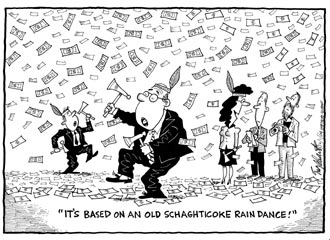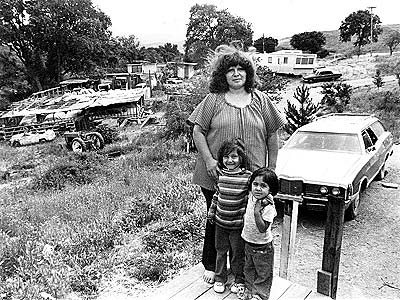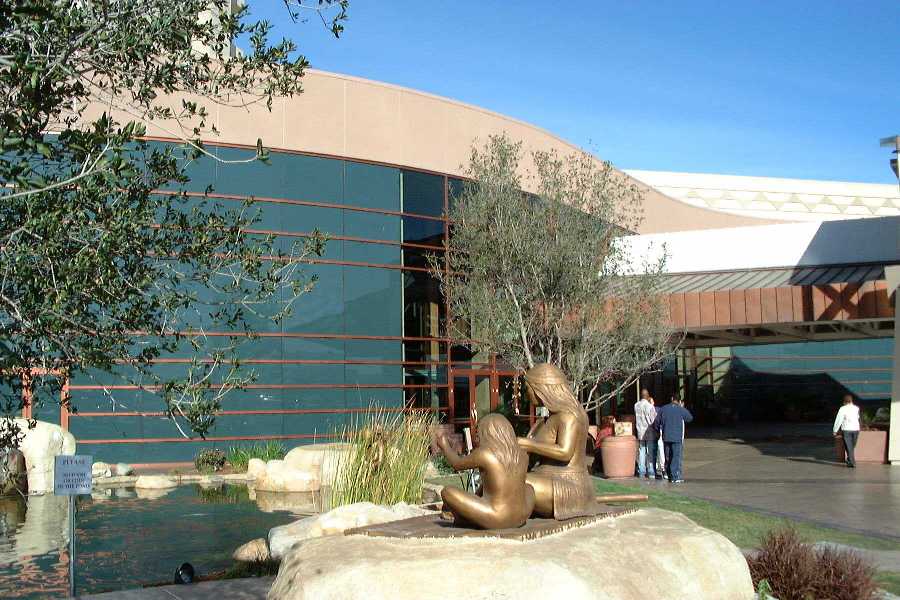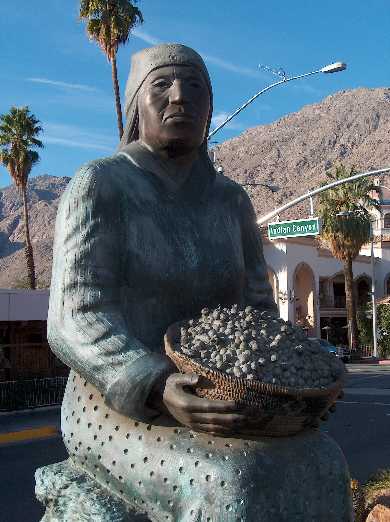 Another Stereotype of the Month entry:
Another Stereotype of the Month entry:
 Another Stereotype of the Month entry:
Another Stereotype of the Month entry:
From the Native Times:
The Red Path Has Turned Green For Some
Commentary by Marty Firerider
4/25/2005
Sadly, some wealthy gaming tribes have turned a blind eye to the needs of their Indian neighbors and Indian service organizations. In California many Indian families have been disenrolled with nearly 1,500 and counting. Gaming has brought in the dominant cultures disease of GREED. There are numerous reservations where non-Indian families were adopted into various tribes years ago. Now these non-Indians have taken control whereby they have disenrolled original Indian families. The American Indian Movement (AIM) usually fought outside forces to preserve sovereignty and culture. Now the new destructive threat is from within, something Indians never thought would happen. Our survival as Native Indians will be achieved though our unity as one people, not disunity.
Gaming is like a double edge blade. It has helped in many positive ways of which does not need to be explained here. However, with gaming money, some tribes have turned on other tribes denying them the opportunity to have gaming, while not offering them any financial solutions. Some reservations have achieved great success with gaming monies, yet the elders don't meet anymore, kids don't graduate from high school due to receiving gaming monies at age 18, some have lost interest for traditional cultural and are influenced by gangster rap, etc.
Many non-Indians run tribal gaming operations while dictating policy on how the money should be spent. Here in California gaming money gravitates toward political legislation that favors gaming, thereby creating a cycle of greed that feeds on its self. On a few reservations adopted families have taken control of the tribal governments resulting in disenrolling many of the original Indian families. They threatened the remaining families with disenrollment and/or loss of monies knowing that no civil court can stop this. One such tribe now pays the remaining enrolled members $45,000 a month. Where poverty once resulted in apathy and lack of motivation, the same goes for having to much wealth.
Many Indian reservations have served their people well with gaming, yet an equal amount seems to have resulted in the opposite. Gaming has the appearance of another intentional strategy by the dominate culture to divide and conquer Indians. Either way, gaming is having unintentional cultural consequences by bringing wealth to some and loss of heritage, indigenous identity and poverty for others. Our ancestors who fought and sacrificed their all to preserve our culture and people would be appalled.
The AIM chapter here in San Diego (www.aimsandiego.org) is involved with many community programs on the reservations and in the urban sector. There are 17 reservations here in San Diego County, including 45,000 urban Indians living in the city of San Diego. The majority of these Indians are not direct recipients of Indian Gaming. Several of the tribes have very successful gaming operations while investing wisely in the future with non gaming businesses. However, AIM as well as other Indian organizations do not solicit nor is recipient of any gaming monies to support their Indian community based programs.
One positive outcome from gaming in California is the revenue sharing compact with the State government. A percentage of Indian gaming profits must go into a collective account where the funds are equally distributed to the non gaming tribes. It has helped alleviate some poverty issues. Of course California has over 100 tribes with many having profitable gaming operations.
Despite the sharing agreement, some tribes work against each other and their own people. Prior to gaming many Indians lived in third world conditions. Families, communities, traditions and sovereignty spirituality united them while disenrollment was unheard of. Today all Indian country is threatened with disunity because with wealth comes Greed and all the evils that accompany it. For without the bonds of family and community an individual has no worth. To acquire or possess more than what one needs (Self Greed) is not the Indian way. Walking the spiritual Red Path with our ancestors of giving and reciprocity are. One can be educated, live and work in the dominant cultures domain. That does not mean one has to loss their spiritual and cultural roots of being Indian.
The American Indian Movement is strong in its convictions as a traditional and spiritual movement that walks the Red path in truth and humbleness. Greed and ego have no place in this organization, which explains why AIM stands strong like a tree while in solidarity with our traditions of Indians helping Indians. What have you done lately to help another Indian?
Marty Firerider is the host of the American Indian Movement Today radio talk show.


Rob's reply
Firerider's position seems to be that Indians should remain poor because poverty is spirtually pure. Or something.
>> Sadly, some wealthy gaming tribes have turned a blind eye to the needs of their Indian neighbors and Indian service organizations. In California many Indian families have been disenrolled with nearly 1,500 and counting. <<
Firerider starts with a non sequitur. Even if both the claims above are true, the second one doesn't follow from the first one. Ignoring the needs of other Indians isn't the same as disenrolling some of your own Indians.
>> Gaming has brought in the dominant cultures disease of GREED. <<
So Indian tribes didn't experience greed before gaming? Tribes didn't sell each other out to the white man for guns, alcohol, or other favors? Tribal councils didn't sign deals, hire their relatives, or vote themselves perks to enrich themselves? Sure they didn't.
>> There are numerous reservations where non-Indian families were adopted into various tribes years ago. Now these non-Indians have taken control whereby they have disenrolled original Indian families. <<
Which reservations? Which non-Indian families? How "numerous" is numerous? Let's name names and ennumerate numbers here. These unspecified claims are unpersuasive.
I'll make a counterclaim that the problems aren't that numerous. Unlike Firerider, I can bolster that claim with some facts. According to the 2000 Census, California has almost 250,000 Indians. However unfortunate the disenrollment of 1,500 people is, it's a drop in the bucket compared to the total population. Disenrollment isn't a serious threat to the Indian population as a whole.
Moreover, the disenrollment issue is largely limited to California, where non-Indians disrupted and disintegrated the many small bands of Indians. Yet Firerider is casting aspersions on Indian gaming nationwide. A careful writer would have said gaming is causing disenrollment problems in California but not elsewhere.
>> Our survival as Native Indians will be achieved though our unity as one people, not disunity. <<
Undoubtedly true, but trite and obvious. Indians have been calling for unity at least since Tecumseh's era 200 years ago. Firerider is talking as if he knows something that's escaped most Indians.
About half the nation's tribes don't even conduct gaming. Is Firerider arguing that they're doing better overall than their gaming brethren? That they have fewer problems with alcohol, gangs, crime, and suicide? I'd love to see his statistics on that.
Unfortunately, the facts flatly refute this assertion. See The Facts About Indian Gaming for details.
>> Gaming is like a double edge blade. It has helped in many positive ways of which does not need to be explained here. <<
On the contrary, Firerider should go into the benefits of gaming at length. The whole point of his essay is to minimize or deny these benefits.
>> However, with gaming money, some tribes have turned on other tribes denying them the opportunity to have gaming, while not offering them any financial solutions. <<
So gaming is a double-edge sword, but the solution is even more gaming? Illogical.
Some tribes have opposed the expansion of off-reservation Indian gaming because they realize it threatens to turn people against all Indian gaming. That's arguably a selfless motive, not a selfish one.
>> Some reservations have achieved great success with gaming monies, yet the elders don't meet anymore, kids don't graduate from high school due to receiving gaming monies at age 18, some have lost interest for traditional cultural and are influenced by gangster rap, etc. <<
So elders used to meet before Congress passed the Indian Gaming Regulatory Act in 1988? Kids graduated from high school more than they do now? They were active in their traditional cultures until they heard the siren call of free money?
That will be news to all the tribes that barely managed to maintain their existence until gaming. If Congress didn't terminate them, government policies and economic forces almost dismantled them. Without any reason to hope, many Indian families left their poverty-stricken lands and assimilated into the mainstream.
This is partly responsible for the disenrollment conflicts. Those who stayed and suffered wonder why those who left should benefit now that being an Indian is in vogue. It isn't all about money, although that's certainly an issue.
As for education, some gaming tribes make their per capita payments conditional on being a high-school graduate. These tribes are creating language and cultural programs, providing tutoring and after-school care, and offering scholarships or tuition payment for college. Does Firerider seriously think California's Indian children were better educated before the advent of gaming? I'd love to see the statistics on that, but I'm almost certain he's wrong.

Non-Indians dictate to Indians?
>> Many non-Indians run tribal gaming operations while dictating policy on how the money should be spent. <<
Again with the unspecified quantities. How many is "many"? Hiring a company to manage your operations isn't the same as ceding control to it. And I'd say non-Indians don't dictate how any tribes should spend their revenues on social services—the whole point of Indian gaming. If Firerider knows some exceptions, let's have their names.
>> Here in California gaming money gravitates toward political legislation that favors gaming, thereby creating a cycle of greed that feeds on its self. <<
Any money tribes spend on lobbying is determined by the Indians running the tribes. It's their sovereign right to spend their money as they see fit. And since gaming revenues are funding their economic, social, and cultural renaissance, why wouldn't they try to pass legislation to help them? Firerider imputes a greed motive that doesn't necessarily exist.
Here's where Firerider's denial of gaming's benefits becomes problematical. If gaming is good overall, then more gaming is better. Problems such as greed are only a side issue unless gaming isn't achieving its aims.
So which is it, Marty: Is gaming good or bad overall? From the tone of your article, one has to surmise you think it's bad overall. That Indians were living in some golden era of cultural wholeness and unity until gaming came along.
>> On a few reservations adopted families have taken control of the tribal governments resulting in disenrolling many of the original Indian families. <<
Firerider made this claim before, so it's redundant. But before he said the problem was happening on "numerous" reservations. Now it's "a few" reservations. Which is it, Marty?
I suggest it's a few, which means the problem isn't as serious as Firerider has made it out to be.
>> Where poverty once resulted in apathy and lack of motivation, the same goes for having to much wealth. <<
Here is Firerider's first admission that things weren't so golden in the pre-gaming era. But how does this square with his assertion that elders were meeting and kids were participating in traditional culture before gaming? Were they apathetic before gaming or weren't they?
How much wealth is too much, I wonder? $45,000 a month? Would Firerider like to see the benefits of Indian gaming capped somehow? What cap would he suggest?
>> Many Indian reservations have served their people well with gaming, yet an equal amount seems to have resulted in the opposite. <<
Wow, this guy must be hurting himself straddling that fence of his.
If the benefits and drawbacks of gaming are literally equal, what should we do? Flip a coin to see if we should continue allowing it? This screed is approaching intellectual dishonesty. If Firerider can't determine whether gaming has had a positive or negative effect, he should leave the decision to the people who can determine it. I.e., to anyone who's studied the evidence.
>> Gaming has the appearance of another intentional strategy by the dominate culture to divide and conquer Indians. <<
Well, the tribes that pursue gaming are doing so voluntarily. And others have chosen not to pursue it. That's what being sovereign and making your own decisions is all about.
Again, I want to know Firerider's basic position. Were tribes better off before gaming or not? By what measure?
>> Either way, gaming is having unintentional cultural consequences by bringing wealth to some and loss of heritage, indigenous identity and poverty for others. <<
Gaming is bringing poverty to some tribes?! Not just bypassing the tribes who choose not to pursue it, but actively causing them to become poor? Where in the world does Firerider get this from...Time magazine?
This claim is patently ridiculous. Firerider doesn't try to explain how this could happen because it hasn't happened and can't happen.
>> Our ancestors who fought and sacrificed their all to preserve our culture and people would be appalled. <<
I suspect they'd be more appalled by the decimation and destitution of so many tribes. I suspect they'd see gaming exactly as today's tribal leaders see it: the best and only way to restore their lost heritage.
>> A percentage of Indian gaming profits must go into a collective account where the funds are equally distributed to the non gaming tribes. It has helped alleviate some poverty issues. <<
Sounds like gaming is working after all. So should we continue it or not? Is Firerider opposed to alleviating poverty or isn't he?

United but poor?
>> Prior to gaming many Indians lived in third world conditions. Families, communities, traditions and sovereignty spirituality united them while disenrollment was unheard of. <<
Wow. Spiritually united but living in third-world conditions. Tough call here. As an Indian, would you rather be spiritual but poor or secular but rich?
Unfortunately, the choice isn't that black and white. Ever since the end of the Indian Wars, if not before, many tribes have suffered a loss of their traditions and spirituality. With the government taking their lands, banning their religions, and placing their children in boarding schools, how could it be otherwise?
Even without these depredations, tribes were surrounded by the encroaching Western culture. Indians were forced to join a wage economy if they wanted to buy the food they could no longer produce themselves. Working 40 hours a week, commingling with non-Indians, seeing how others lived probably had more of an effect than anything else. When your choice is a traditional lifestyle or running water, gas, and electricity, it's not surprising how most people choose.
As for disenrollment, it wasn't an issue until recently because tribes were poor and Indians didn't want to belong to them. Is that the golden era Firerider is advocating? Should Indians be like monks and take a vow of poverty to remain spiritually pure?
>> Today all Indian country is threatened with disunity because with wealth comes Greed and all the evils that accompany it. <<
Does Firerider have any solutions except vague calls for "walking the spiritual Red Path"? Because every Indian leader I've ever heard, including the ones involved in gaming, say the same thing. Tribes should work together, do what's best for their people, think seven generations ahead, etc., etc.
So what exactly does Firerider want? Should we reform Indian gaming, and if so, how? Or should we eliminate it and return to the days of yore?
You know, the days of yore when elders met and kids adhered to tradition? But were apathetic and lacked motivation? The days when people were spiritually united even though they lived in third-world conditions? The days when greed didn't exist and people were strong, except those who were uneducated, unemployed, sick, addicted, or in prison? Those days of yore?
You can see how muddled Firerider's thinking is. He can't come to a clear conclusion. So let's do it for him. Gaming has been good for Indians. It has helped them renew and revitalize their cultures. Whatever problems exist, they aren't significant enough to turn back the clock to the previous era. For Indians, this is the best time in the last 500 years, since Europeans first started killing them.
More on Firerider
California AIM, CNIGA Leaders Offer Divergent Views of Indian Gaming Impact
Related links
Greedy Indians
The facts about Indian gaming
|
. . . |

|
All material © copyright its original owners, except where noted.
Original text and pictures © copyright 2007 by Robert Schmidt.
Copyrighted material is posted under the Fair Use provision of the Copyright Act,
which allows copying for nonprofit educational uses including criticism and commentary.
Comments sent to the publisher become the property of Blue Corn Comics
and may be used in other postings without permission.